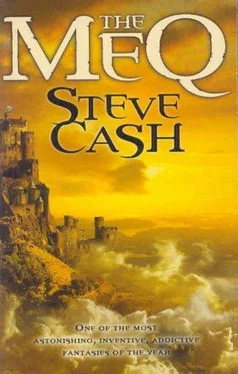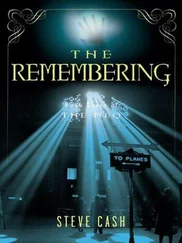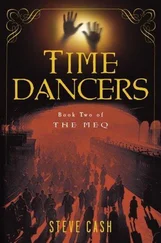Steve Cash - The Meq
Здесь есть возможность читать онлайн «Steve Cash - The Meq» весь текст электронной книги совершенно бесплатно (целиком полную версию без сокращений). В некоторых случаях можно слушать аудио, скачать через торрент в формате fb2 и присутствует краткое содержание. Год выпуска: 2005, Издательство: Del Rey, Жанр: Фэнтези, Детективная фантастика, ya, на английском языке. Описание произведения, (предисловие) а так же отзывы посетителей доступны на портале библиотеки ЛибКат.
- Название:The Meq
- Автор:
- Издательство:Del Rey
- Жанр:
- Год:2005
- ISBN:нет данных
- Рейтинг книги:4 / 5. Голосов: 1
-
Избранное:Добавить в избранное
- Отзывы:
-
Ваша оценка:
- 80
- 1
- 2
- 3
- 4
- 5
The Meq: краткое содержание, описание и аннотация
Предлагаем к чтению аннотацию, описание, краткое содержание или предисловие (зависит от того, что написал сам автор книги «The Meq»). Если вы не нашли необходимую информацию о книге — напишите в комментариях, мы постараемся отыскать её.
The Meq — читать онлайн бесплатно полную книгу (весь текст) целиком
Ниже представлен текст книги, разбитый по страницам. Система сохранения места последней прочитанной страницы, позволяет с удобством читать онлайн бесплатно книгу «The Meq», без необходимости каждый раз заново искать на чём Вы остановились. Поставьте закладку, и сможете в любой момент перейти на страницу, на которой закончили чтение.
Интервал:
Закладка:
Steve Cash
The Meq
This book is for Star and Cody
It is dedicated to the memory of my good friends
Gary McCullah (1946–1970) and K. G. Wells (1948–2001)
ACKNOWLEDGMENTS
I want to thank my longtime friends Frances Bissell and her husband, Tom, for making this possible. I owe an invaluable debt of gratitude to my true and able assistant, Anne Logan, for believing in the story and urging me on. I want to thank my friend and partner, John Dillon, for his keen eye and ear, his patience, and always helpful suggestions. I want to thank my daughter Star for insisting that I write it all down. I want to thank my son Cody for his support when I most needed it, and also for marrying the beautiful Allison and producing the equally beautiful Chloe. I need to thank Sydney Cash because I never have, and I want to thank my sister, Linda Baird, who has put up with me for a lifetime. I also want to thank Cheryl Coates and Elizabeth Byrd at First Impressions because I said I would if we ever made it to print.
BOOK ONE
PART I
The Child is father of the Man.
— William Wordsworth1. EZEZAGUN (STRANGER)
The kindness of strangers. Is it true? Most often, probably not, but invariably in everyone’s life there is a moment, a window in time, where only a stranger will make sense of a senseless thing and pull you out or through or wherever you need to go and do not have the power to do so alone. It will feel as gentle and effortless as an angel’s touch. It will come unasked and unannounced. It will come from someone whose name you may or may not recall, whose face may blur with memory, but whose deed, in one way or another, saved you. It will be a stranger.
For me, that window was May 4, 1881. It was my twelfth birthday for the first time. I was traveling with my mama and papa on the last leg of a long journey west from St. Louis to Central City, a boom town in the mountains above Denver. We were jammed into a noisy, crowded train filled with people of all sorts and sizes. My papa was going to be the “ lapur de urre, ” the “thief of gold” in all the great Rocky Mountains. He knew nothing of mining, but he always liked to say he knew everything about gold. “The Basque,” he said, “will never steal your purse, they have the mountains.” My mama always laughed a little when he said these things, but she never disbelieved him. She loved him in a special way, a way as old and wise and silent as the mountains themselves. A way, as you will see, that is unique to them and to me.
My mama said, “Zianno, put that baseball glove down and leave it be. You make me crazy with the rubbing, the rubbing.” That’s my name — Zianno. My mama sometimes called me “Z” because her name was Xamurra and my papa’s name was Yaldi and he liked to think of us as “X,” “Y,” and “Z,” the three unknowns. My mama made the baseball glove by hand in St. Louis. It was my most treasured possession. It was crude and rudimentary, but in 1881, so was baseball.
I kept that glove with me at all times on the trip west. I used it as a pillow at night and rubbed it constantly with my spit to “break it in.” My papa had made me a baseball — actually two, one I kept with me and tossed around and the other he kept with him. We never played with that one.
“Mama,” I said, “you know I’ve got to make it soft. The softer the better.”
“Soft is one thing, my child. Crazy with rubbing is another. But never mind, there is something much more important I want to talk about today.”
The train was inching its way through a mountain pass. Outside, there seemed to be hundreds of waterfalls, some small, some large; a result of heavy spring rains. Papa had made his way to the front of our car in order to listen to a fat man ramble on about recent gold strikes. I put my glove down and looked at Mama’s face. I loved to look at Mama’s face. She had creamy skin and her features were round and small. Round nose, mouth, and eyes that were coal black and always laughing. But not that day. She was serious and I knew it.
I said, “What, Mama? What’s important?”
Mama looked hard into my eyes and reached up with her hands to touch my face. She ran her fingers over my eyebrows and down the line of my cheekbone and traced the outline of my lips. I sat dead still. She touched me often with much love, but not often in this way. It was as if she was trying to remember me with her fingers. The train lurched suddenly from side to side. We were beginning the descent from the pass and picking up speed. It startled Mama, but she wasn’t scared and neither was I. We were sick of trains. She put her hands back in her lap.
“You must listen to me, Zianno. This is your birthday, your twelfth birthday.”
“I know that, Mama, and when we get to—”
She cut me off with a hand gently placed on my mouth. “Now listen, my son. Your birthday is different, this birthday, this one today is different, just as we are different; you, me, and your papa.”
“Different? How are we different, Mama? Because we are Basque?”
“We are Basque, yes, that is true, Z, but we are more than just Basque, we are. older.”
“Older?” I was confused. “You mean you are older. I am twelve, Mama.”
She let out a long sigh and her eyes glanced out of the window, then back to me.
“I mean our. our people are older, different, not like the Giza, the other people. Your papa will tell you everything you need to know, everything about us when we get to Central City.”
“Mama,” I said, “I don’t know what you are talking about.”
She leaned forward and kissed me on the forehead, then sat back in her seat. “I know, my child, I know. I said the same thing to my mama a long time ago, a very long time ago.”
The train was gaining speed. The men gathered at the front of our car were laughing loudly at something the fat man had said, my papa included.
Through the window, the space between our train and the mountain wall opposite was widening. I could clearly see the river racing beside us, swollen from the runoffs and waterfalls I had seen at every turn higher up the mountain. I was trying to make sense of what Mama had said and I wanted her to tell me more, but she was staring out of the window at the rushing water. I started rubbing the pocket of my glove and leaned my head closer to the window. Up ahead, we were coming to a low bridge over a narrow section of the river. Then I saw something very strange.
“Mama, look!”
“What, Z? What?”
“Look up there, Mama, by the bridge. There’s a scarecrow waving his arms.”
She moved closer to me and followed my finger to where I was pointing. Up ahead, next to the bridge on the embankment, someone or something in an enormous black coat was waving like crazy at the train.
“It’s a scarecrow, Mama.”
“That’s no scarecrow,” Mama said. Her voice was low and even, as if she were talking to herself. She rose slightly out of her seat and stared harder at the scarecrow. He was getting larger as we were getting closer. In a blink, we were passing him and I could see that he was not a scarecrow at all. He was a man, a tall man with a beard and a small, round cap on his head. His long arms in the great black coat dropped to his sides as we passed. I saw his eyes, which were wide open, and his mouth in the shape of an O. So did Mama. She grabbed my hand, jumped up out of her seat, and screamed, “Yaldi, Yaldi!”
The train was already on the bridge. Through the noise of the train and the men laughing, my papa heard Mama’s voice and turned toward the back of the car. I saw him catch her eye and I turned to look at Mama too. Her eyes were a bonfire of black, but without panic. I turned back to look at Papa. His eyes were the same. Their eyes were locked on each other, and for an instant, there was no sound in my world. No voices, no laughter, no metal screeching as the train tried to brake and avoid the washed-out track on the other side of the bridge.
Читать дальшеИнтервал:
Закладка:
Похожие книги на «The Meq»
Представляем Вашему вниманию похожие книги на «The Meq» списком для выбора. Мы отобрали схожую по названию и смыслу литературу в надежде предоставить читателям больше вариантов отыскать новые, интересные, ещё непрочитанные произведения.
Обсуждение, отзывы о книге «The Meq» и просто собственные мнения читателей. Оставьте ваши комментарии, напишите, что Вы думаете о произведении, его смысле или главных героях. Укажите что конкретно понравилось, а что нет, и почему Вы так считаете.












